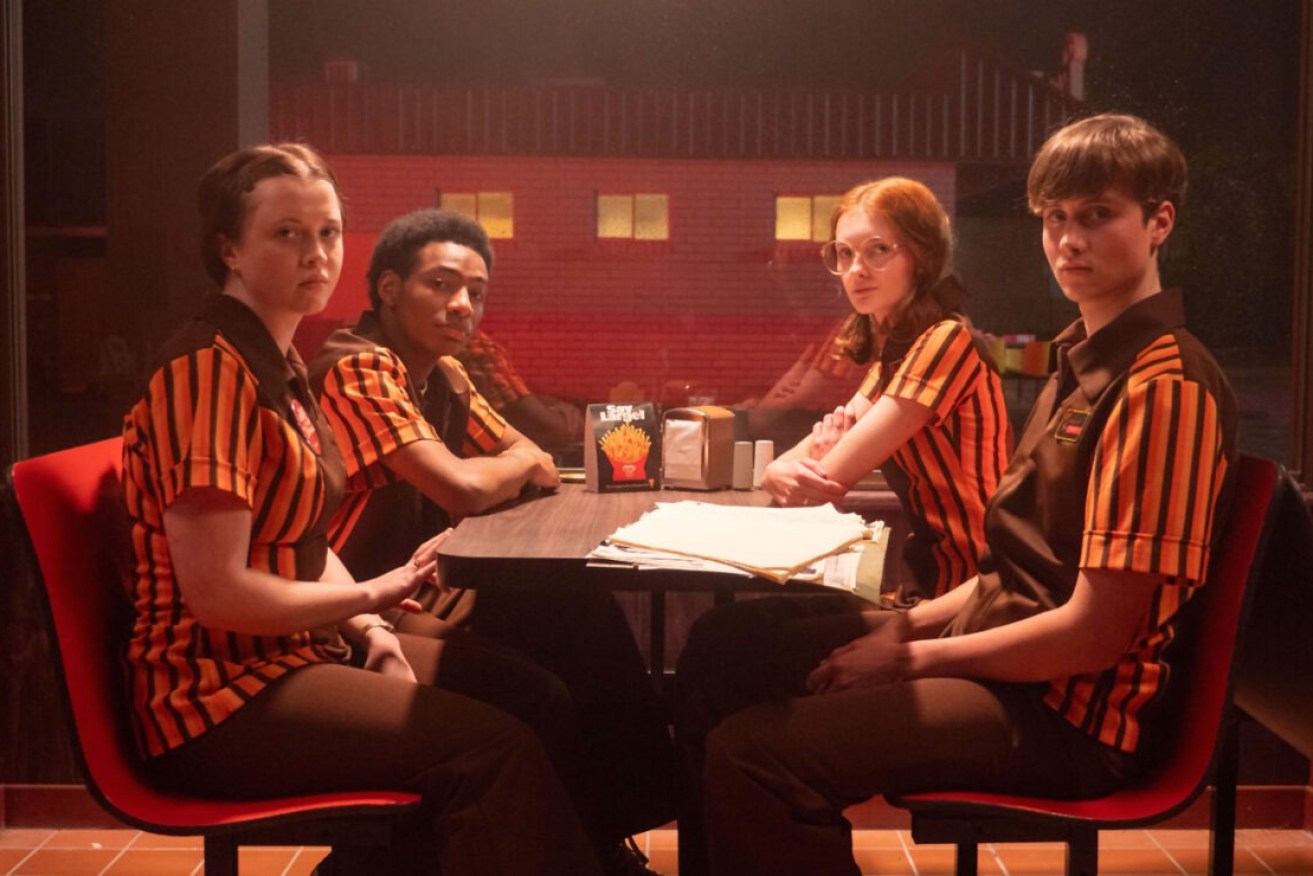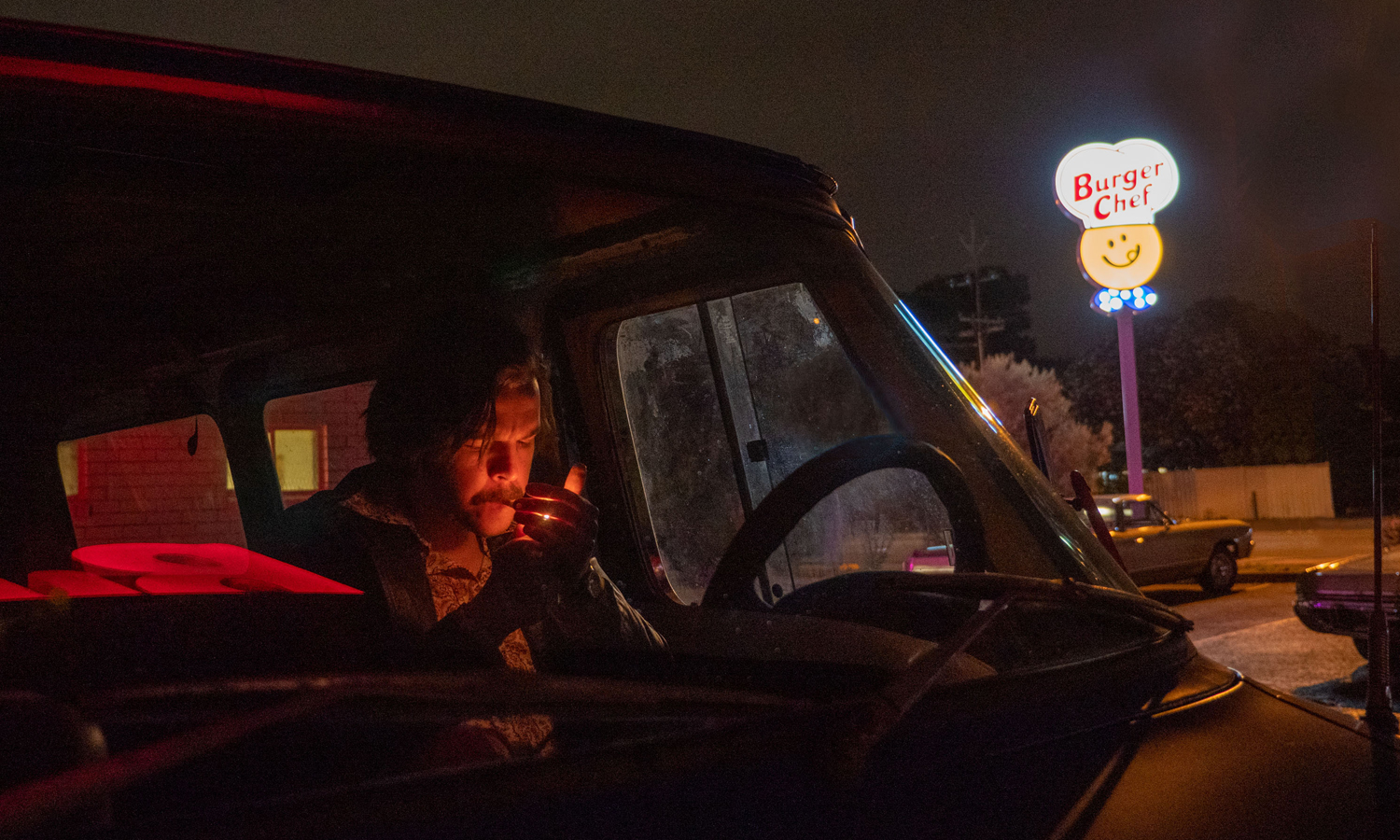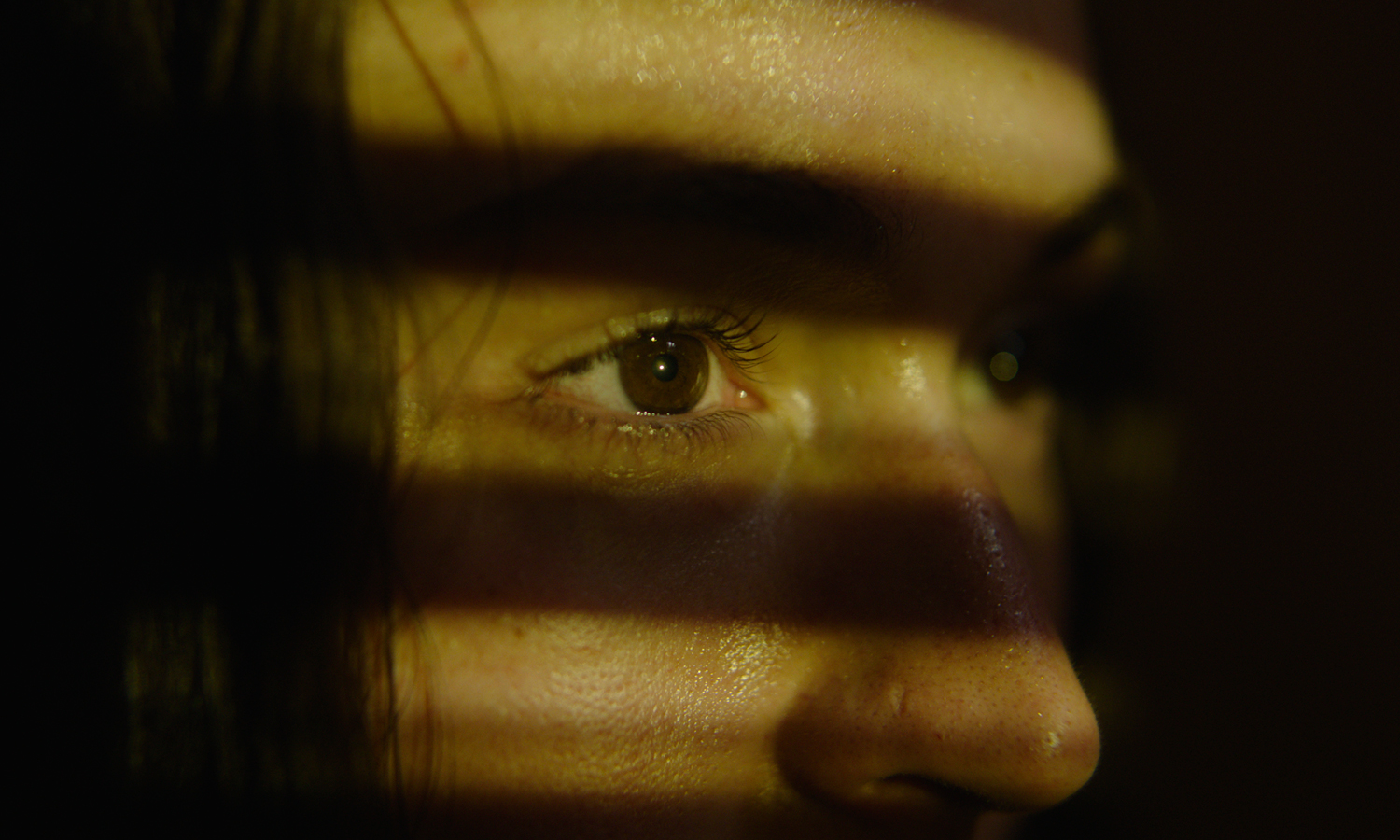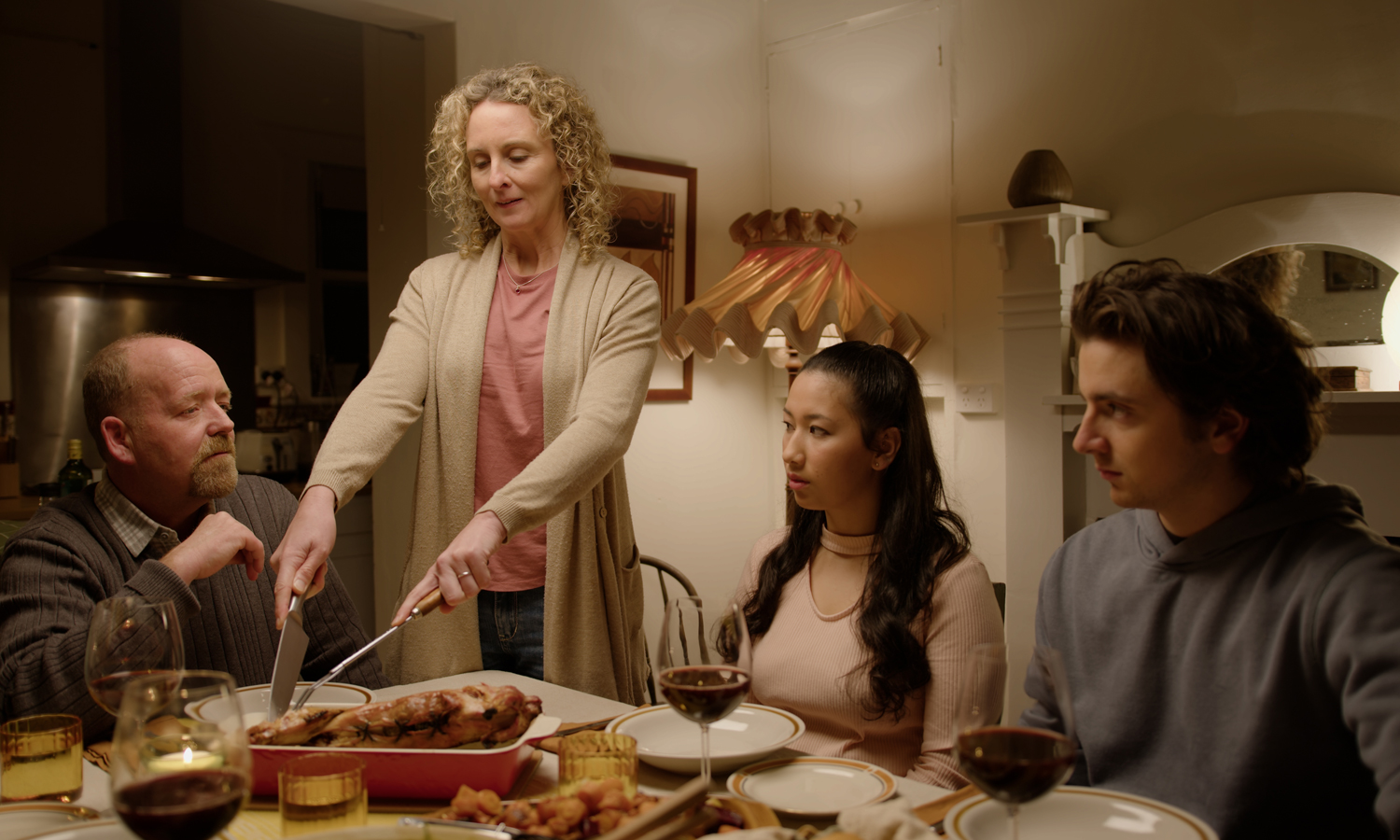SA screen talent shines in these three intriguing new films
South Australian screen projects being presented in this year’s Adelaide Film Festival include a murder documentary, a low-budget horror feature and a feminist revenge fable about domestic violence.


Made in SA: True-crime film 'Speedway' investigates the 1978 murder of four teenagers who worked at a fast-food restaurant in America's mid-west. Photo: supplied
Speedway
Has a South Australian film helped solve a decades-old crime?
A cloak of mystery surrounds the true-crime, drama documentary Speedway, the Adelaide Film Festival’s preview presentation investigating the 1978 murder of four teenagers who worked at a Burger Chef in Speedway, in America’s mid-west.
First-time filmmaker Luke Rynderman, who co-directed with Adam Kamien, is giving away nothing about what the documentary drama may have uncovered in relation to the 45-year-old crime in which police had suspects but no one was charged.
After using Facebook groups to contact relatives of the survivors, and witnesses, Rynderman and Kamien, an actor and investigative journalist, saved $10,000 to travel to Speedway, Indiana, where they recorded a series of interviews. On the strength of what they brought back, they attracted producers, and Screen Australia and the South Australian Film Corporation provided development funding
“We were trying to find out who we thought had done it, to try and solve it and see what we could bring to it,” Rynderman says. “Broadly speaking, the police had bungled the investigation very early on because they were very ill-prepared for a case of that size, and there were agency issues.”
Rynderman, an art director who studied screenwriting at the Victorian College of the Arts and moved to Adelaide for the film, grew up in a household fascinated by true crime. This was before the rise of podcasts had given cold-case investigations a cultural moment, and it gave him what he calls “a freakish knowledge” of crime cases.
“I was on an unsolved mysteries site and the Burger Chef case came up as an unsolved crime,” Rynderman says. “It was four teens who had been murdered; it was unsolved. They found the bodies 48 hours later but nobody had been charged.”
The disappearance of the teens was initially misunderstood as a robbery – a small amount of money was missing – and the restaurant re-opened the next day without proper investigation or photographs of potential evidence. When an abandoned car was found hours later, it was clear it was something worse. Another day later, the bodies of the murdered teens were found in a wooded area more than 30 kilometres away.
“We were very keen to get there and see what we could do,” Rynderman says. “We were two Australians who were going over [to the US] investigating this crime that happened 45 years ago.”

The Speedway directors re-created the Burger Chef restaurant in Cumberland Park. Photo: supplied
Over the next couple of years, Rynderman and Kamien brought in cast and crew and began to work on re-creating the restaurant scene as it was when the four young fast-food chefs went about their last night. Rynderman’s background in graphic and art design makes him a perfectionist, and the Burger Chef restaurant and signage – as well as an adjacent Dunkin’ Donuts – was re-created so convincingly inside a former Chinese restaurant in Adelaide’s Cumberland Park that people tried coming in for a burger.
“It was on radio. People thought a burger shop and a donut shop were opening in South Australia,” he says.
Rynderman, who sourced period Burger Chef uniforms from a deceased estate, says the restaurant interior was re-created down to the cups, and he scoured car shows to source local American left-hand drive vehicles for outside scenes.
“The believability of it is amazing,” he says. “The actors playing the kids were incredible and their work with the dialect coach was able to nail the ’70s mid-west drawl.”
Whether and by how much the documentary drama advanced the case, no one is saying, but emphasis has been placed on protecting the sensitivities of the victims’ families, who are still traumatised by their loss.
The hybrid documentary drama is a key new AFF Investment Fund feature and comes with the backing of producers Anna Vincent (I Am Mother), Bonnie McBride (Embrace Kids), Louise Nathanson (Golda) and Lisa Scott (The Tourist). South Australian cast and crew were among the audience at the gala hometown unveiling (on Friday), with a further screening scheduled for October 29 (Mercury Cinema).
You’ll Never Find Me
Two Flinders University screen production graduates with a shared love of horror made their first feature, You’ll Never Find Me, without outside funding, partly because it gave them the freedom to – in their words – make their own mistakes.
The resulting horror film, an intense study in the dynamics of trust between a young woman sheltering from a storm and the older man whose trailer door she knocks on, was the only Australian film in the Tribeca Film Festival and is now in competition in the Adelaide Film Festival.
Adelaide Film Festival director Mat Kesting says he wanted to give young filmmakers Indianna Bell and Josiah Allen the attention they deserved. He knew of their work from their short film The Recordist, and had them on his radar for future AFF investment.
“I think they are an incredible talent and I was really keen to invest in their future but they just went and made it!” Kesting says. “They’re amazing; they’re unstoppable.”

A still from low-budget horror You’ll Never Find Me. Photo: supplied
The low-budget thriller – so low Allen’s mother did the catering – was written by Bell, with both of the duo directing. Allen, whose natural focus is more on editing, lighting and design, says the gap between their specialist skills is closing over time.
“Directing was kind of the meeting in the middle and over time it has become more of a complete collaboration,” Allen says. “But Indianna definitely and definitively writes everything.”
Speaking from Sitges in Spain, where their film has just screened in the Sitges horror and fantasy festival, Bell says the story was built around actors Jordan Cowan and Brendan Rock, who they worked with on The Recordist.
“We thought, we already had these great actors at our fingertips so why not write around them?” Bell says. “Let’s put a young woman and an older man in a room together. What, naturally, are the dynamics out of that and how can we play with them to keep the audience on edge, and keep them guessing?”
Bell says the horror film was not meant as a feminist cautionary tale about a young girl sheltering in a stranger’s trailer, and is more a study of the shifting tensions. But the directors love the horror genre and want to continue working in that vein.
“We had a lot of fun with that and I definitely think we want to continue working in this area,” Bell says. “Thrillers are definitely our first love.”
the important thing was to make mistakes on our own terms
Allen says he and Bell were inspired by other filmmakers who started out slowly with DIY productions, and treated their first major feature as “film school”.
“The mistakes will be your mistakes; the things that turn out well – you’ve done them, that’s great – but really the important thing was to make mistakes on our own terms. We are going to make a lot of mistakes on our own. It’s really hard to make a film, but we wanted to be able to learn from those mistakes with lower stakes for our first one.”
They were also inspired by the challenge of pulling off a low-budget feature whose atmospherics relied heavily on the raging storm outside. While the exterior shots were filmed at St Kilda, the interiors were filmed on a built set at the old Hendon film studios, which gave them more control.
“You could get much more out of a day, rather than spending two hours trucking something out somewhere and unpacking, then packing up at the end of the day,” Bell says. “And fighting with wind and birds and angry neighbours and all those things that happen when you’re shooting on location!”
Allen says the film’s inclusion in the festival program and the response so far had been particularly rewarding because so many people did them favours while it was being made.
“The entire crew were young, up-and-coming artists and everyone was ready to step up into the roles that they had and everyone just killed it,” he says. “You prep for it thinking it’s about the process of making, it’s about learning, it’s about all those things, but it’s just fantastic that the crew and cast and everyone gets confirmation that their hard work mattered.”
You’ll Never Find Me opened on the weekend and is screening again on October 27 (Palace Nova Eastend).
Blame the Rabbit
The rabbit, a tricky dish to get right, is served a little dry, which is enough for Helen’s husband to physically assault her after the dinner guests have left. What follows in this short film is a feminist revenge drama that summons up the Greek myth of the Gorgon, the female monster whose looks could kill.
Written and directed by Elena Carapetis, well known as a stage actor in South Australia, the film lingers uncomfortably on the operating table as Helen undergoes plastic surgery while awake, so she can instruct the surgeon on her extreme makeover.
Carapetis – whose acting career goes back to Heartbreak High, and who has been seen more recently in the television series Aftertaste and The Hunting – cannot speak highly enough of the industry pathways provided by SBS through its Emerging Writers’ Incubator program. It placed her under the mentorship of experienced producer Lisa Scott (The Tourist, The Hunting) and made possible a long-held interest in screenwriting.
“I just didn’t know how to do it – I didn’t know what the pathway was because I was so entrenched in theatre,” Carapetis says. “I had worked with Lisa as an actor and I was also in The Tourist – and I really liked her. She’s so experienced and has great taste and a great eye. She’s been doing it for such a long time.”

Blame the Rabbit is a cautionary tale. Photo: supplied
To apply for the Emerging Writers’ Incubator program, Carapetis wrote 10 pages adapted from an old play idea which included a scene in which a woman has plastic surgery while awake.
“Lisa said, ‘Let’s make it – you’ll direct’. It was terrifying,” Carapetis says.
She chose the Gorgon myth because she grew up a Greek Cypriot surrounded by mythical stories celebrating the power of women. Now she wants to reclaim them as part of her heritage.
“They have informed western civilisation and storytelling and theatre deeply, but I feel like Greek stories are often appropriated by other places,” she says. “All of my work is a Greek tragedy in disguise. So this is a domestic story with a mythic or epic quality on top of it.”
While her film – which premiered at the Film Festival’s gala opening and will have further screenings on October 23, 27 and 28 – is about merciless revenge, Carapetis says she does not condone violence, except as a fable in which women become monstrous after their divinity is repressed.
With short films increasingly accepted by audiences, particularly at festivals, the director is treating Blame the Rabbit as a calling card for the kind of work she hopes to make. She sees it as the first of a trilogy based on a Greek myth or tragedy that looks at the objectification of women and as part of a career goal to expand into screenwriting and directing.
“I never want to stop acting and I really miss it – I’ve had to put that on pause for this year so I could do this,” she says. “But I really like directing my own screenplays and I think if I write a film, I would want to direct it.”
The Adelaide Film Festival runs from October 18-29. Read more Film Festival stories and reviews here.
This article is republished from InReview under a Creative Commons licence. Read the original article.
InReview is an open access, non-profit arts and culture journalism project. Readers can support our work with a donation. Subscribe to InReview’s free weekly newsletter here.




